Liquid Line Replacement L61
Tools Required
J 39400-A Halogen Leak Detector
Removal Procedure
- Recover the refrigerant. Refer to Refrigerant Recovery and Recharging .
- Remove the left headlamp. Refer to Headlamp Assembly or Headlamp Bulb and/or Cornering, Sidemarker, Park, Turn Signal Bulb Replacement in Lighting Systems.
- Remove the surge tank. Refer to Radiator Surge Tank Replacement in Engine Cooling.
- Remove the washer bottle. Refer to Washer Pump/Reservoir Replacement in Wiper/Washer Systems.
- Remove the battery. Refer to Battery Replacement in Engine Electrical.
- Remove the battery box bolts from the battery box.
- Disconnect the negative battery cable from the wheelhouse.
- Remove the nut retaining the liquid line to the strut tower.
- Disconnect the harness and vent hose retainers from the liquid line.
- Remove the evaporator outlet hose nut from the TXV.
- Remove the evaporator outlet hose from the TXV.
- Remove the liquid line nut from the TXV.
- Remove the liquid line from the TXV.
- Remove the liquid line nut from the receiver dehydrator.
- Remove the liquid line from the receiver dehydrator.
- Position the battery box inboard to allow for routing of the liquid line.
- Route the liquid line above the battery box and the ground lug.
- Lift the rear portion of the liquid line upward and remove the liquid line from the vehicle.
- Remove and discard the sealing washer from the liquid line. Refer to Sealing Washer Replacement .
- Install protective caps to the receiver dehydrator and the TXV to prevent contamination and desiccant saturation.
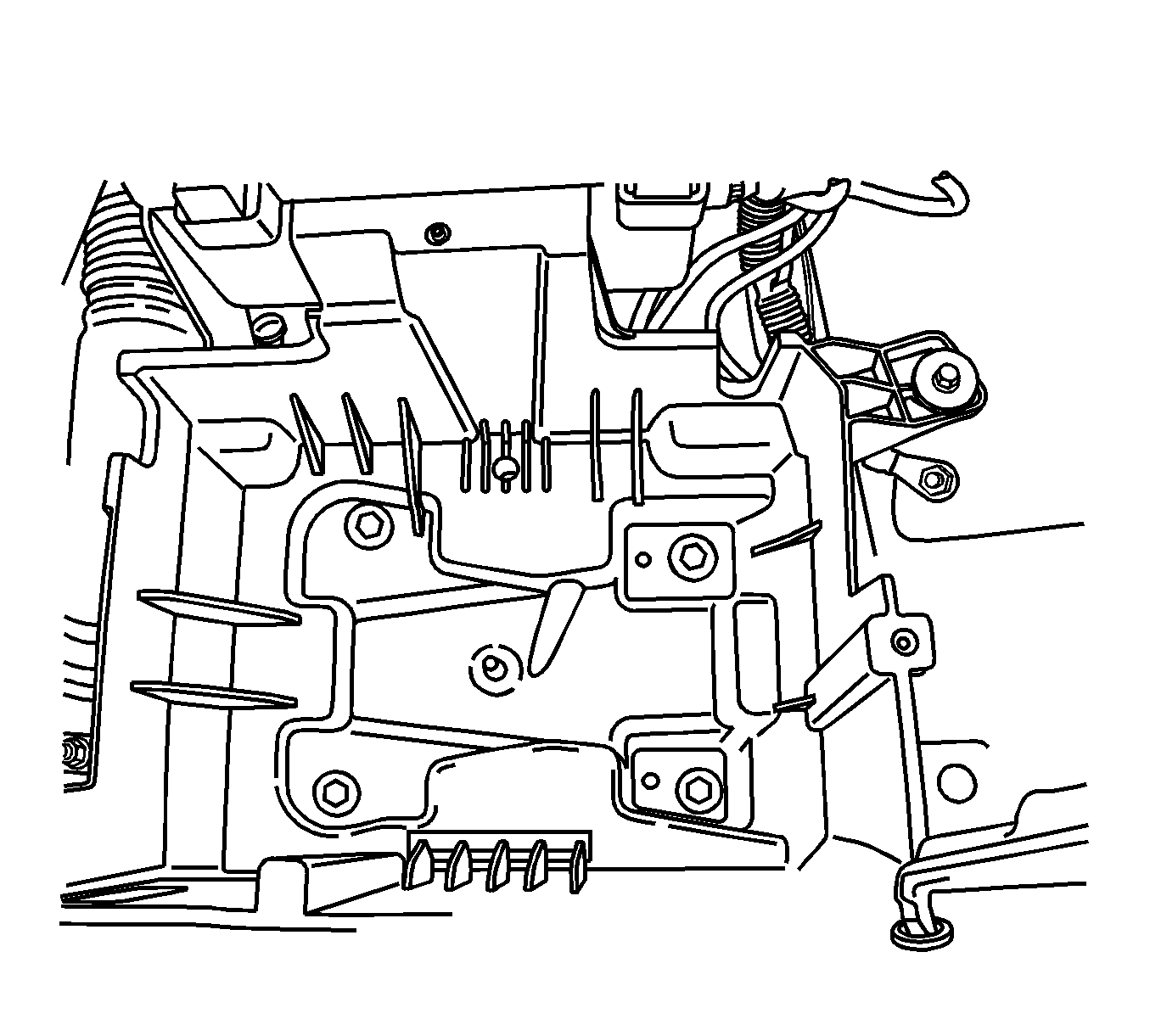




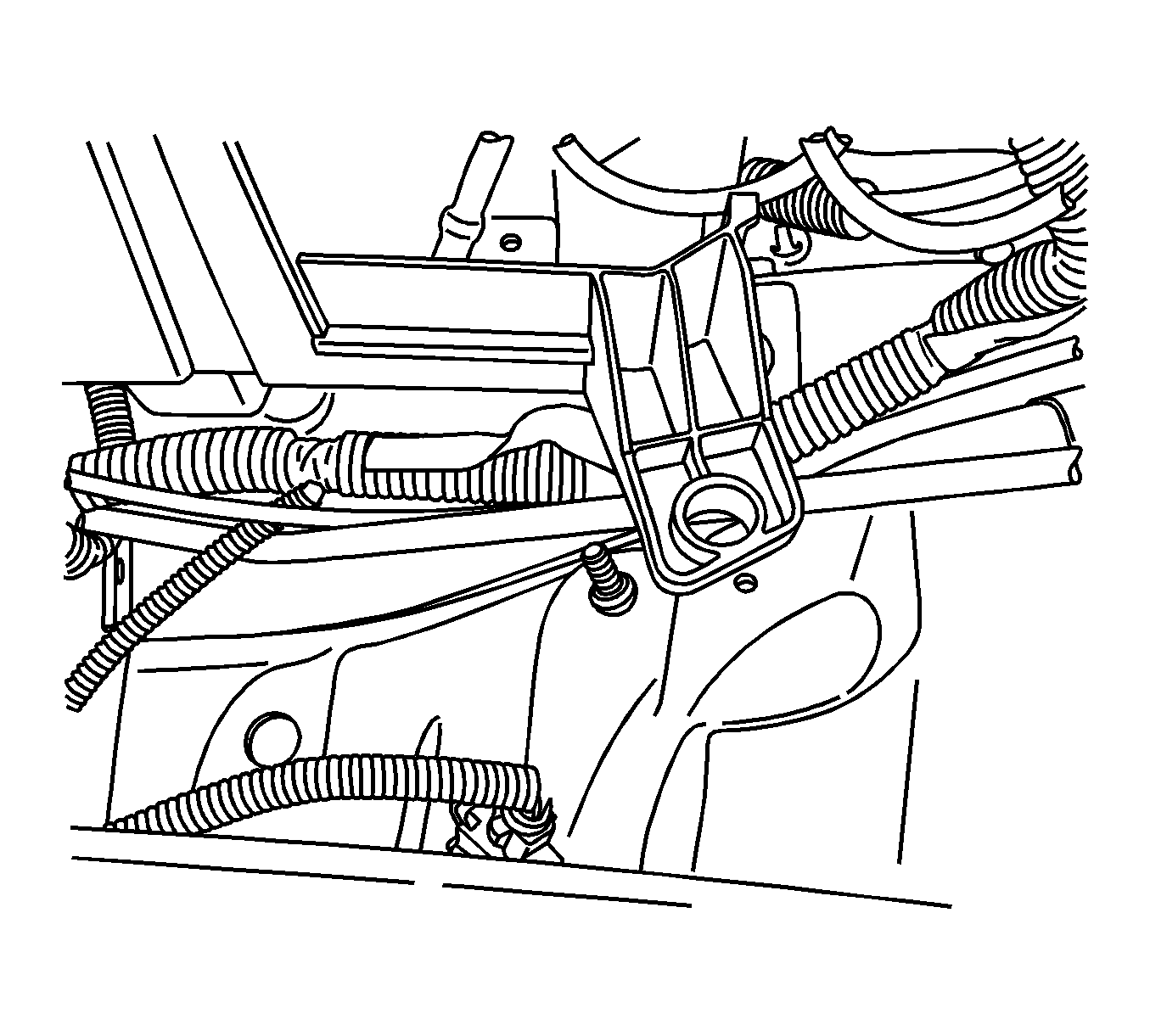
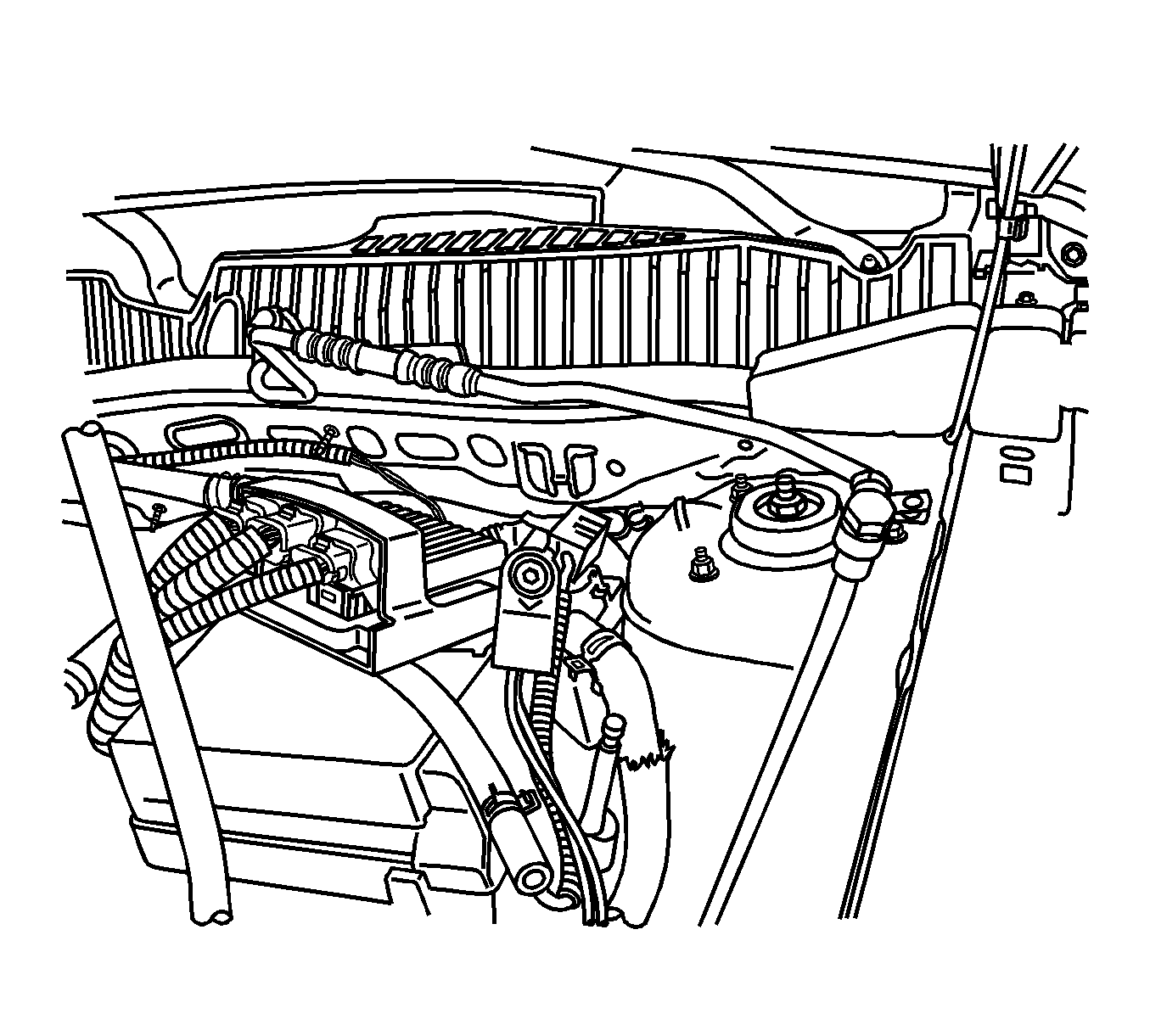
Installation Procedure
- Remove the protective caps from the receiver dehydrator and the liquid line.
- Install the new sealing washer to the receiver dehydrator. Refer to Sealing Washer Replacement .
- Route the receiver dehydrator end of the liquid line into position.
- Install the liquid line to the receiver dehydrator.
- Install the liquid line nut to the receiver dehydrator.
- Remove the protective cap from the TXV and the liquid line.
- Install a new sealing washer to the liquid line at the TXV.
- Install the liquid line to the TXV.
- Install the liquid line nut to the TXV.
- Install the evaporator outlet hose to the TXV.
- Install the evaporator outlet hose nut to the TXV.
- Route the liquid line below the battery box and the ground lug.
- Connect the negative battery cable to the wheelhouse.
- Install the battery box bolts to the battery box.
- Install the battery. Refer to Battery Replacement in Engine Electrical.
- Install the liquid line to the strut tower.
- Install the liquid line nut to the strut tower.
- Connect the harness and vent hose retainers to the liquid line.
- Install the surge tank. Refer to Radiator Surge Tank Replacement in Engine Cooling.
- Install the washer bottle. Refer to Washer Pump/Reservoir Replacement in Wiper/Washer Systems.
- Install the left headlamp. Refer to Headlamp Assembly or Headlamp Bulb and/or Cornering, Sidemarker, Park, Turn Signal Bulb Replacement in Lighting Systems.
- Recharge the A/C system. Refer to Refrigerant Recovery and Recharging .
- Test the affected A/C joints for leaks using J 39400-A .


Notice: Use the correct fastener in the correct location. Replacement fasteners must be the correct part number for that application. Fasteners requiring replacement or fasteners requiring the use of thread locking compound or sealant are identified in the service procedure. Do not use paints, lubricants, or corrosion inhibitors on fasteners or fastener joint surfaces unless specified. These coatings affect fastener torque and joint clamping force and may damage the fastener. Use the correct tightening sequence and specifications when installing fasteners in order to avoid damage to parts and systems.
Important: Use a large pair of pliers to hold the fitting while tightening the nut. Be careful not to twist the line.
Tighten
Tighten the nut to 16 N·m (12 lb ft).

Tighten
Tighten the nut to 16 N·m (12 lb ft).

Tighten
Tighten the nut to 16 N·m (12 lb ft).


Tighten
Tighten the nut to 15 N·m (11 lb ft).

Tighten
Tighten the nut to 5 N·m (44 lb in).
Liquid Line Replacement L66
Tools Required
J 39400-A Halogen Leak Detector
Removal Procedure
- Recover the refrigerant. Refer to Refrigerant Recovery and Recharging .
- Remove the left headlamp. Refer to Headlamp Assembly or Headlamp Bulb and/or Cornering, Sidemarker, Park, Turn Signal Bulb Replacement in Lighting Systems.
- Remove the air cleaner duct. Refer to Air Cleaner Resonator Outlet Duct Replacement in Engine Controls - 3.5L (L66).
- Remove the surge tank. Refer to Radiator Surge Tank Replacement in Engine Cooling.
- Remove the battery tray. Refer to Battery Tray Replacement in Engine Electrical.
- Loosen the ABS brake modulator assembly nuts from the modulator bracket, if equipped.
- Carefully reposition the ABS brake modulator to allow for liquid line removal, if equipped.
- Remove the liquid line nut from the TXV.
- Remove the liquid line from the TXV.
- Remove the nut retaining the liquid line to the strut tower.
- Remove the nut retaining the liquid line to the strut tower.
- Remove the liquid line nut from the receiver dehydrator.
- Remove the liquid line from the receiver dehydrator.
- Lift the rear portion of the liquid line upward and remove the liquid line from the vehicle.
- Remove and discard the sealing washer from the liquid line. Refer to Sealing Washer Replacement .
- Install protective caps to the receiver dehydrator and the TXV to prevent contamination and desiccant saturation.
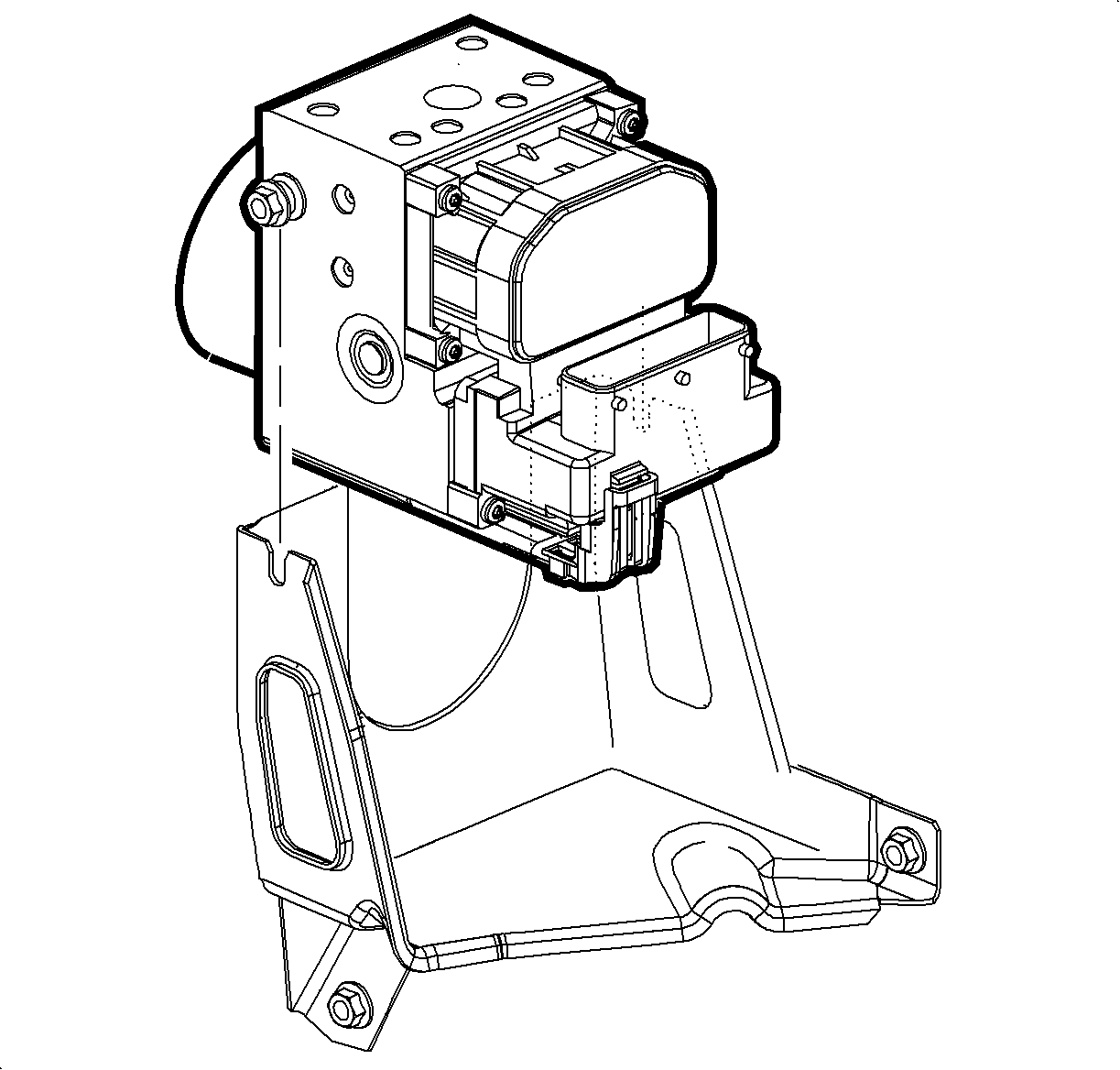

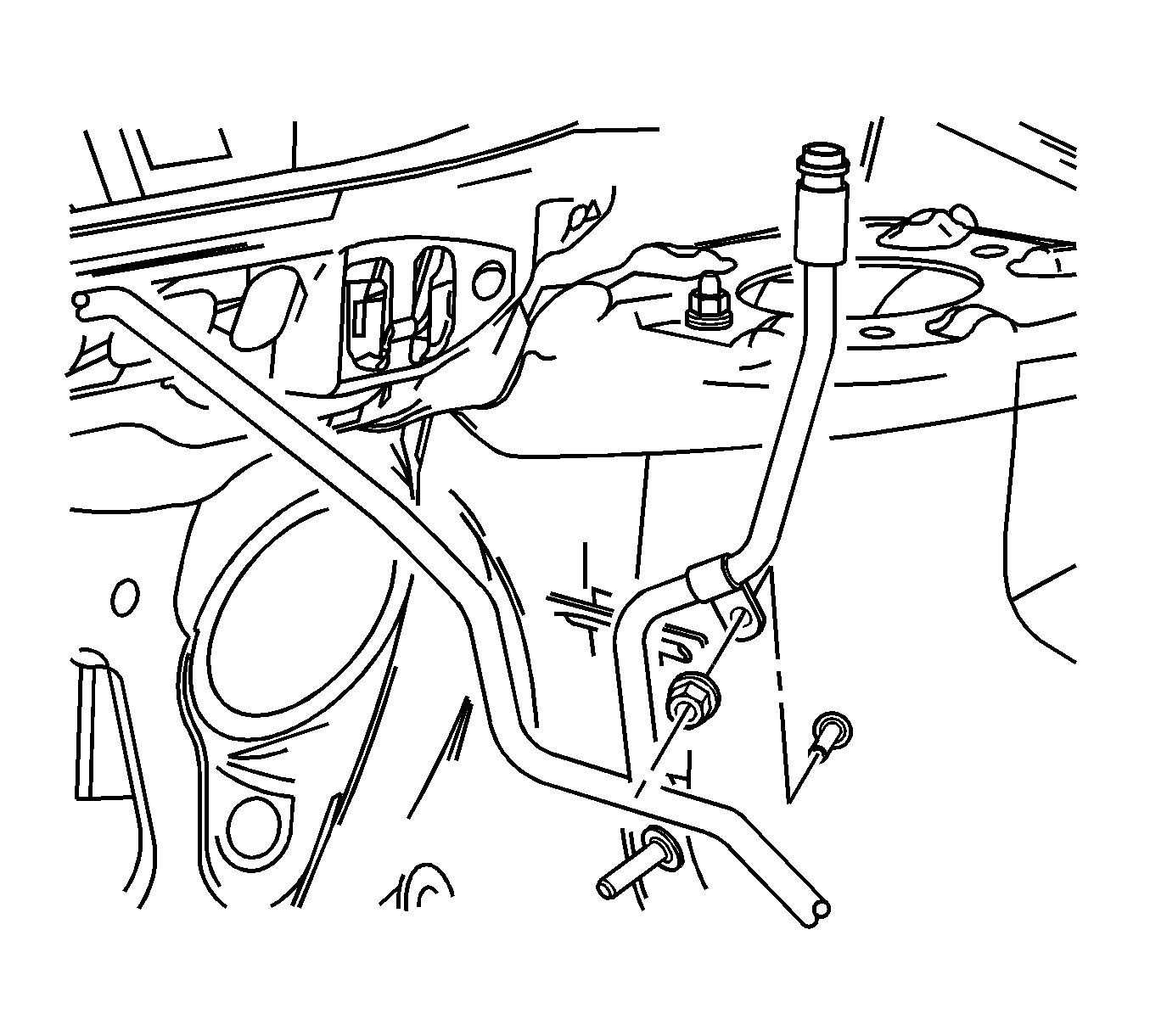

Installation Procedure
- Remove the protective caps from the receiver dehydrator and the liquid line.
- Install the new sealing washer to the receiver dehydrator. Refer to Sealing Washer Replacement .
- Route the receiver dehydrator end of the liquid line into position.
- Install the liquid line to the receiver dehydrator.
- Install the liquid line nut to the receiver dehydrator.
- Carefully reposition the ABS brake modulator assembly to the modulator bracket, if equipped.
- Tighten the brake modulator assembly nuts to the ABS modulator bracket, if equipped.
- Remove the protective cap from the TXV and the liquid line.
- Install a new sealing washer to the liquid line at the TXV.
- Install the liquid line to the TXV.
- Install the liquid line nut to the TXV.
- Install the liquid line to the strut tower.
- Install the liquid line nut to the strut tower.
- Install the battery tray. Refer to Battery Tray Replacement in Engine Electrical.
- Install the surge tank. Refer to Radiator Surge Tank Replacement in Engine Cooling.
- Install the air cleaner duct. Refer to Air Cleaner Resonator Outlet Duct Replacement in Engine Controls - 3.5L (L66).
- Install the left headlamp. Refer to Headlamp Assembly or Headlamp Bulb and/or Cornering, Sidemarker, Park, Turn Signal Bulb Replacement in Lighting Systems.
- Recharge the A/C system. Refer to Refrigerant Recovery and Recharging .
- Test the affected A/C joints for leaks using J 39400-A .

Notice: Use the correct fastener in the correct location. Replacement fasteners must be the correct part number for that application. Fasteners requiring replacement or fasteners requiring the use of thread locking compound or sealant are identified in the service procedure. Do not use paints, lubricants, or corrosion inhibitors on fasteners or fastener joint surfaces unless specified. These coatings affect fastener torque and joint clamping force and may damage the fastener. Use the correct tightening sequence and specifications when installing fasteners in order to avoid damage to parts and systems.
Important: Use a large pair of pliers to hold the fitting while tightening the nut. Be careful not to twist the line.
Tighten
Tighten the nut to 16 N·m (12 lb ft).

Tighten
Tighten the nut to 20 N·m (15 lb ft).

Tighten
Tighten the nut to 16 N·m (12 lb ft).

Tighten
Tighten the nut to 10 N·m (89 lb in).
